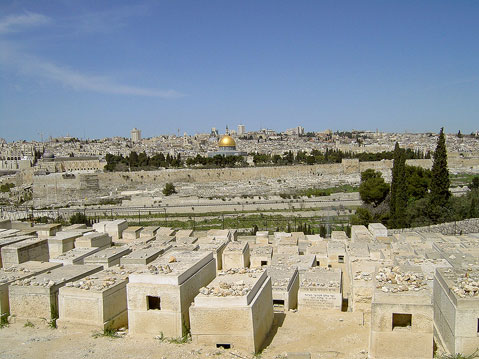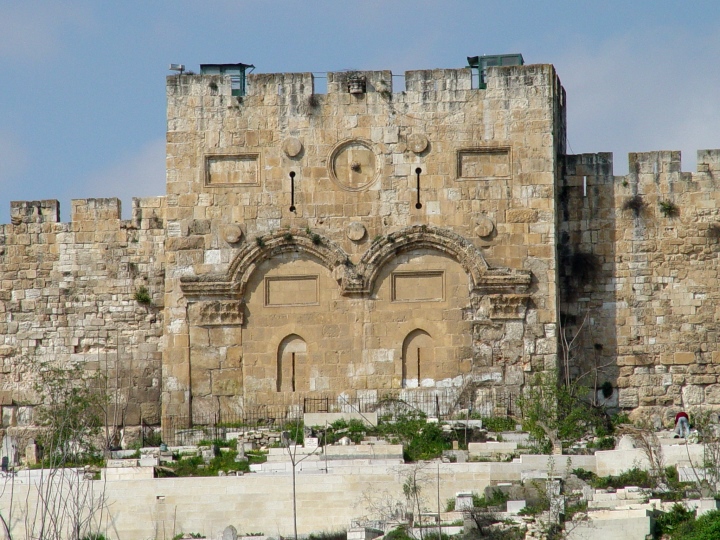Tomb With A View

Stand on the Mount of Olives and you can gaze down across the Old City of Jerusalem and see the place where once the Temple existed.
That site is now occupied instead by the Muslim Dome of the Rock and its golden dome is likely to capture your attention. But lower your gaze and you will see tomb after Jewish tomb, for the chances are that you are standing in, or next to, a huge Jewish cemetery. For Bible-believing Jews this is a highly sought after burial place, not just for the view, but for what the Bible says is destined to happen at this very site.
A King in Jerusalem
Jews first occupied Jerusalem at the time of King David – about 1000 years before Christ. It was the very place that God had chosen to have a temple erected which would symbolises His permanent dwelling in the midst of His people. And it was here, where David placed his throne, where God promised that his greatest descendant would rule when He established His kingdom on earth. This is what God promised King David:
“When your days are fulfilled and you rest with your fathers, I will set up your seed after you, who will come from your body, and I will establish his kingdom. He shall build a house for My name, and I will establish the throne of his kingdom forever. I will be his Father, and he shall be My Son…” (2 Samuel 7:12–14).
There are many such Bible promises about the coming of a King who will reign for God, whose throne will be established in Jerusalem. The prophets of God develop this theme time after time. For example, the prophet Isaiah predicted the birth of a son to a virgin (a prophecy fulfilled when Mary gave birth to Jesus without there being any human father). Then he says this about the destiny of that Son:
For unto us a Child is born, unto us a Son is given; and the government will be upon his shoulder. And his name will be called Wonderful, Counsellor, Mighty God, Everlasting Father, Prince of Peace. Of the increase of his government and peace there will be no end, upon the throne of David and over his kingdom, to order it and establish it with judgment and justice from that time forward, even forever. The zeal of the Lord of hosts will perform this (Isaiah 9:6–7).
Jewish Messiah
Promises like these rightly led faithful Jews to believe that one day God will send them a king who will rule over all the world. But they did not understand that he was also to fulfil another purpose too; for nobody can enter God’s kingdom by right – whatever a person’s birth or pedigree. All of us need to be saved from our sins and that was what Jesus came to achieve when he was born of the virgin Mary. Mary and Joseph were told at the outset what the Son of God had come for:
“She will bring forth a Son, and you shall call His name Jesus, for he will save his people from their sins” (Matthew 1:21).
Just as there are many prophecies about the glorious rule of the Messiah when he comes as King, so there are many predictions about the suffering he was to endure and the sacrifice for sin that he would effect when he gaveup his life in faithful obedience. But, by and large, the Jewish people saw only one side of that two-sided set of prophecies and when Jesus was born there were only a few people who accepted him as their long-awaited King. They were looking for someone who would come from the Mount of Olives to save them from their Roman overlords and to establish a Jewish Kingdom there and then.
Zechariah’s Prophecy
This month’s issue contains the first instalment of a series about Bible prophecy. To anticipate a topic the series will eventually consider, this is what the prophet Zechariah says about the time to come when King Jesus –the Messiah – comes to rescue Jerusalem and the Jewish people:
Behold, the day of the Lord is coming, and your spoil will be divided in your midst. For I will gather all the nations to battle against Jerusalem; the city shall be taken, the houses rifled, and the women ravished. Half of the city shall go into captivity, but the remnant of the people shall not be cut off from the city. Then the Lord will go forth and fight against those nations, as He fights in the day of battle. And in that day his feet will stand on the Mount of Olives, which faces Jerusalem on the east. And the Mount of Olives shall be split in two, from east to west …(Zechariah 14:1–4).
It is because of this prophecy, and a matching one in Ezekiel, that Jewish believers want to be buried at this location. They want to be first in the queue when their Messiah raises people from the dead.
Eastern Gate

The prophet Ezekiel has a detailed description both about the departure of God’s glory from the temple at the time of the Babylonian captivity and its eventual return, through the eastern gate of the city of Jerusalem (see Ezekiel 43:1-4). In what seems to have been an attempt to thwart this prophecy, the Muslim rulers of Jerusalem blocked up the only gate along the eastern wall in 810 AD and it has remained closed for 12 centuries. They also placed a Muslim cemetery along the entire length of the eastern wall, perhaps in the hope that this would deter any Messianic arrival. But the purpose of God cannot be obstructed in that way. When the time is right King Jesus will return and the resurrection of the dead will indeed take place, just as God has promised, to raise to life all those men and women who have put their trust and faith in Him, and who fell asleep in death fully persuaded that their Saviour is coming to bring them back to a better life. The view such people most want is not just to see Jerusalem glorified, but to see the King himself in all his glory.
The original version of this article was published in Glad Tidings magazine. You can subscribe to receive a free copy of the Glad Tidings magazine each month by clicking on the logo below.